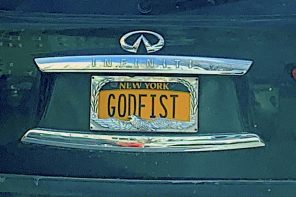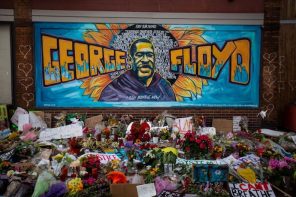Personal research conducted among my lefty friends shows that for many liberals, reading David Brooks amounts to a kind of a guilty pleasure. Brooks is witty, urbane, occasionally brilliant, and he has been nothing but resolute against Trump and Trumpism. But Brooks’s overall congeniality makes it easy to forget that he is consistently wrong about the nature of the still-unfolding economic crisis, which he (in neoliberal fashion) thinks is mainly about economic losers needing to acquire some discipline and bootstrap themselves to success.
And Brooks can be spectacularly wrong about other things, as he has just demonstrated in an unbelievably fatuous column on the “Unifying American Story,” which he frames as a story of exodus and covenant. Brooks rings all the changes on this theme, from the Puritans’ righteous “errand into the wilderness,” to the Founders’ identification with the oppressed Israelites, to the stated wish of Frederick Douglass to be included in the American destiny, and, finally, to the waves of immigrants seeking to make their own exodus from oppressive cultures elsewhere.
Brooks cites this story’s “many virtues as a national organizing myth,” including the way it “welcomes in each group.” He concludes by blaming lefty academics for trashing the national story and portraying U.S. history as “a series of power conflicts between oppressor and oppressed.”
Wow, just wow.
For his own sake, Brooks needs to slow down lest he make an utter fool of himself with similar forays into fantasyland.
The whole point of the kind of covenant that both the original Israelites and their Puritan epigones cherished was precisely its exclusivity: the fact that MY people, not your people, are anointed to be God’s very own pet project. That cornerstone of exclusivity made, and continues to make, the Puritan enterprise in North America (and America’s enterprise in the world at large) a nightmare for the excluded.
Does Brooks not know, for example, that the American Revolution was in large part an effort by the Southern colonists to preserve the institution of slavery against rising anti-slavery sentiment in Britain?
He cites Frederick Douglass; does he not know what Douglass had to say about the “organizing national myth” that Brooks so admires? Does he not know that Douglass died an embittered man at the height of Jim Crow ugliness?
He writes about the immigrant dream of exodus to this land of milk and honey. Does he not know that immigrants were welcomed only if they were white or capable of becoming white, which crucially meant sharing in the general white loathing of African Americans?
Brooks either doesn’t know about, or chooses to ignore, how the notion of a special anointing or a special divine blessing is what allowed a prayerful William McKinley to announce with confidence in 1900 that God had blessed the genocidal American takeover of the Philippines.
He seems unaware of how the inevitable hubris associated with the idea of a national (divine) election continues to let Americans ignore what the rest of the world has long perceived as a brutal and bloody imperalism manifesting itself in places like Vietnam and Iran. I mean, how can God’s anointed nation possibly be doing such awful things?
Where white Americans complacently see their history “in an upward spiral” under special providential protection, nonwhite Americans, and almost everyone outside our borders, see this New Israel behaving more like Old Egypt in its worship of wealth and power.
Brooks ends his column with a wistful plea for a new Moses to come along to revive the Exodus template and “tell us what our goal is.”
My plea is that someone will come along and tell Brooks what our actual history is – and how his kind of misty-eyed mythologizing gets in the way of seeing it clearly.





